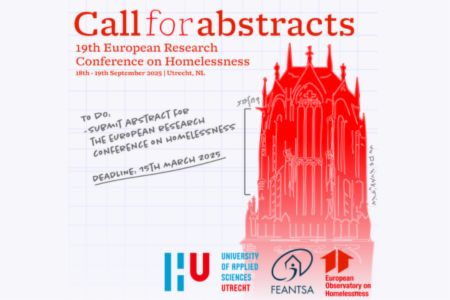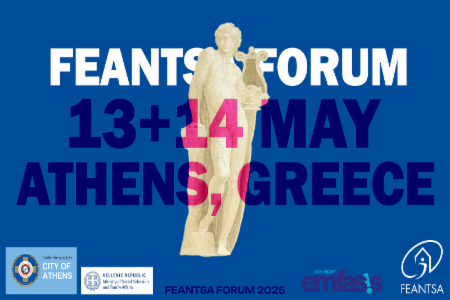Statement: The Housing Situation for Roma in the EU Remains Difficult
Download the full statement here
In early October 2020, the European Commission launched the new EU Roma strategic framework for equality, inclusion and participation setting out seven major objectives for progress at the EU level for the period of 2020 - 2030.[i] Three of these objectives are horizontal in the areas of equality, inclusion and participation. The other four are sectoral objectives in the areas of education, employment, housing and health. For the first time, the framework includes quantitative EU headline targets to monitor achievement towards the established objectives.[ii] The post 2020 EU Roma framework aims at achieving more and faster progress in improving life conditions in terms of effective equality, socio-economic inclusion, and meaningful participation, for the biggest and most discriminated ethnic minority in Europe.[iii]
FEANTSA commends the improvements brought by the EU Roma strategic framework and would like to see Members States committing to eliminating housing segregation and deprivation as well as homelessness among the Roma communities in the EU.
Housing is one of the areas in which continuous investment and political engagement is required. After a decade of work under the previous EU Roma framework, an evaluation of the housing situation of the Roma shows that “Especially due to inadequate and segregated housing, the housing situation remains difficult.”[iv]:
· 30% of Roma live in dwellings with no connection to water.
· 36% of Roma live in dwellings with no toilet, shower and bathroom.
· 78% of Roma live in overcrowded housing.
· 43% of Roma are discriminated against when trying to buy or rent housing.
A direct connection between homelessness and ethnicity is another factor that weighs against the Roma communities. The Institute of Global Homelessness indicates that “the relevant local ethnic, social or racial minorities tend to be overrepresented among the homeless population. Across Europe, Roma populations have been shown to be more at-risk for homelessness than non-Roma groups.”[v] Comprehensive data regarding Roma experiencing homelessness in the EU are scarce, but FEANTSA members and partners report an increase in the numbers of Roma sleeping rough when they exercise their free movement right within the EU in the search of jobs and income opportunities. Based on these inputs, FEANTSA participated in consultations and submitted a position paper on the access to adequate housing for Roma for the post 2020 framework. [vi] Thus, FEANTSA welcomes the new EU Roma strategic framework, together with the Proposal for a Council Recommendation on Roma equality, inclusion and participation. Objective number 7 of the framework focuses in particular on housing and aims to “Increase effective equal access to adequate desegregated housing and essential services”: the EU level of progress on this point is to reduce the gap in housing deprivation by at least one third by 2030.[vii] As a minimum level of progress, the EC proposes that the majority of Roma will not have to face housing deprivation at the end of 2030.
While we appreciate the concrete levels of progress set by the Commission, we note that it is not acceptable that the goal by 2030 is to reduce housing deprivation only by a third, when currently 61 percent of Roma experience housing deprivation. Data show that housing is the area with the least successful examples of improvement for Roma in the last decade. Despite this, it is the only objective of the new EU framework for which the increase is established to a third, while for the other objectives is required to have an increase in the progress by at least half.
In terms of national strategies, FEANTSA strongly believes that Member States should prioritize action on improving housing for Roma and invest financially in innovative measures that aim to entirely eliminate the gap in housing deprivation between Roma and non-Roma. Addressing the issue of housing can also contribute to achieving the other objectives of the framework - improving Roma health and increasing effective equal access to quality healthcare, education, and employment. Providing access to affordable and adequate housing is an essential public health measure, which in the context of the current pandemic needs to become a priority for all Member States. Roma who already lived in substandard and overcrowded housing conditions have been hit particularly hard by the effects of the pandemic as well as by the measures taken to contain the virus.[i]
The new framework proposes the use of EU funding for preventing and fighting segregation in housing as well as to “implement focused pilot initiatives with the aim of testing and demonstrating working approaches to concrete inclusion aspects (housing, employment, social security) through the use of innovative funding approaches”. For piloting projects on housing, we strongly recommend to the EC to closely consider the Housing First[ii] model which allows for rapid access to permanent housing as well as for an integrative approach to support people to exit situations of homelessness. The single most important innovation in homelessness service design in the last 30 years, the Housing First model has proven very successful in the USA and Canada and in several European countries. One very good example is FEANTSA awarded project[iii] “Ending Family Homelessness through Housing First in Brno: A Randomised Control”[iv] for families in Brno (Czech Republic). Here, a pro-Roma NGO in collaboration with local authorities successfully used ESF funds to house 50 families (of which two thirds were Roma). The families housed in this project experienced improvement in their well-being and social inclusion and, in general, found privacy, security and stability.
After Romania and Bulgaria joined the EU, big waves of migration started taking place towards the western countries, among which were Roma migrating in the search of a better life. Despite this, some members of the Roma communities experienced poverty, improper housing and homelessness as well as increased waves of anti-Roma racism and hate speech when residing abroad. There are reasons to believe that history will repeat when the accession of the Western Balkans to the EU will happen, if measures will not be taken. Scapegoating and blaming of Roma must stop. Thus, FEANTSA particularly welcomes point (f): “provide social support and access to mainstream services for homeless Roma people” from the Proposal for a Council Recommendation.[v] Member States where Roma experience homelessness, especially when exercising their free movement right (e.g. Sweden, Norway, Germany, Denmark) must make use of this provision by including in their national strategies, and ensuring financing for, measures aiming to facilitate access to affordable and adequate housing for Roma. It is time that no Roma mobile EU citizen finds themselves homeless in a host MS while travelling to look for income opportunities that they cannot access in their own country of residence.
FEANTSA calls on the EC and MS to a) ensure access to adequate and affordable housing for Roma across the EU, including for Roma mobile EU citizens who travel alone or accompanied by family members b) include anti-discrimination criteria in the national strategies to prevent and combat discrimination against Roma on the housing market and c) allocate specific funding for the measures developed in the national frameworks to increase access to proper housing for Roma. We will continue to offer our support on these matters.
For more information, please contact Simona Barbu at simona.barbu@feantsa.org
[1]The new EU Roma strategic framework for equality, inclusion and participation (full package), accessed October 2020
[1] EU level target on minimum progress to be reached by 2030 and minimum progress to be reached for Roma by 2030.
[1]Newsroom of DG Democracy, Europe’s largest ethnic minority continues to face intolerable discrimination and unequal access to vital services accessed October 2020 <https://www.coe.int/en/web/democracy/newsroom/-/asset_publisher/XpxicDtFK3Js/content/europe-s-largest-ethnic-minority-continues-to-face-intolerable-discrimination-and-unequal-access-to-vital-services/16695?inheritRedirect=false>
[1] Communication from the Commission to the European Parliament and the Council. A Union of Equality: EU Roma strategic framework for equality, inclusion and participation, Brussels, 7.10.2020 COM(2020) 620 final.
[1] Institute of Global Homelessness, State of Homelessness in Countries with Developed Economies, 2019. accessed October 2020 <https://www.un.org/development/desa/dspd/wp-content/uploads/sites/22/2019/05/CASEY_Louise_Paper.pdf>
[1]The EU Roma Framework beyond 2020. A homelessness service providers perspective, accessed October 2020 <https://www.feantsa.org/download/the-eu-roma-framework-beyond-20206021333909889474270.pdf>
[1] Current housing deprivation: Roma 61%; general population 17.9% (gap: 43.1 pps).
[1] Fundamental Rights Agency, Coronavirus pandemic in the EU – impact on Roma and Travellers - Bulletin 5, accessed October 2020 <https://fra.europa.eu/en/publication/2020/covid19-rights-impact-september-1>
[1]Housing First Guide Europe, accessed October 2020 <https://housingfirsteurope.eu/assets/files/2017/03/HFG_full_Digital.pdf>
[1]News: World Homeless Day: FEANTSA Organises Workshop and Announces Winner 2017 Ending Homelessness Awards, accessed October 2020 <https://www.feantsa.org/en/news/2017/10/12/world-homeless-day-feantsa-organises-workshop-and-announces-winner-2017-ending-homelessness-awards?bcParent=27>
[1]Great success in Brno: Rapid Re-Housing has achieved its goal, accessed October 2020 <https://www.brno.cz/brno-aktualne/tiskovy-servis/tiskove-zpravy/a/velky-brnensky-uspech-rapid-re-housing-dosahl-sveho-cile/>
[1] Proposal for a COUNCIL RECOMMENDATION on Roma equality, inclusion and participation on the issue of homelessness, Sectoral objective “Access to adequate desegregated housing and essential services”.





